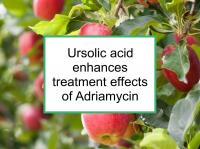Ursolic acid is a compound (a type of pentacyclic triterpene) that forms part of the waxy coating of fruits such as apples and cranberries. Ursolic acid has been shown to inhibit tumor formation and growth of (hormone receptor positive (ER+/PR+), HER2-positive (HER2+) and triple negative (ER-/PR-/HER2-) breast cancer.
Ursolic acid reverses multidrug resistance
Ursolic acid has been shown to reverse multidrug resistance in breast cancer cells. One study reported that ursolic acid resensitized cisplatin-resistant liver cancer cells to cisplatin chemotherapy. Another study found that ursolic acid reversed resistance to paclitaxel (paclitaxel) in paclitaxel-resistant triple negative breast cancer. Still another study demonstrated that ursolic acid resensitized multidrug resistant ER+/PR+ breast cancer cells to doxorubicin chemotherapy. Now a new preprint (a study that has not completed formal peer review and publication) has reported that ursolic acid also sensitizes doxorubicin-resistant triple negative breast cancer cells to doxorubicin.
Latest research shows ursolic acid potentiates doxorubicin
The study referenced above was designed to investigate whether ursolic acid can affect the resistance of triple negative breast cancer cells to doxorubicin. To conduct the study, the authors assessed the viability, proliferation, and apoptosis (programmed cell death) of doxorubicin-resistant triple negative breast cancer cells with and without treatment with ursolic acid.
Ursolic acid was found to reduce the growth, and alleviate resistance to doxorubicin, of two doxorubicin-resistant triple negative breast cancer cell lines. The authors demonstrated that multidrug resistance-associated protein 1 (ABCC1) expression was downregulated by ursolic acid. As a result, ursolic acid abrogated the malignant phenotypes of doxorubicin-resistant triple negative breast cancer cells. The authors conclude that ursolic acid increases sensitivity of triple negative breast cancer cells to doxorubicin by inactivating ZEB1-AS1/miR-186-5p/ABCC1 signaling.
Please see our articles on foods to eat and avoid for triple negative patients and those on doxorubicin for more information.
